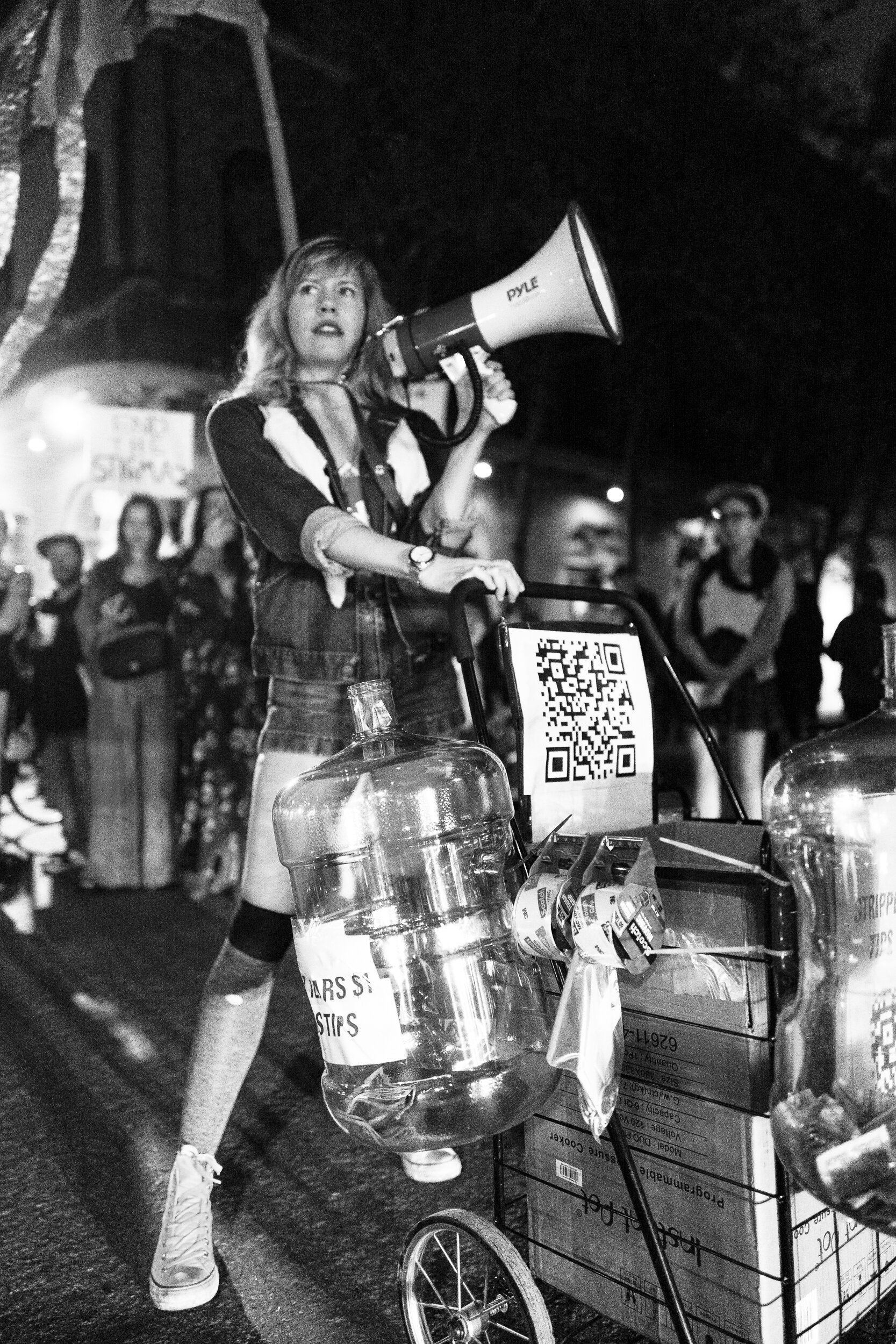Rights, Not Rescue
Strip Club Dancers Protest, New Orleans, LA
2018
-text below gallery-
Rights, Not Rescue
February 4th, 2018
On February 1st, 2018 the members of BARE, Bourbon Alliance for Responsible Entertaining, and their supporters held a march in protest of police raids about a week earlier that left eight Bourbon Street strip clubs shuttered. The raids were conducted under the justification of confronting human trafficking on Bourbon Street following undercover investigations, though zero arrests were made during the raids related to the claim and thin evidence was provided to support their actions. It is reported that in the process of these raids male officers made derogatory statements toward the women working, stood in the dressing rooms as they changed and took pictures of them while undressed. It is also reported that officers announced women’s legal names in front of their customers, losing the cover of their stage name. The shutdown of the clubs left the dancers and other employees in an indefinite state of unemployment in the weeks prior to New Orleans’ busy Carnival season being in full effect.
During the march women spoke out to the crowd, giving testimonials that these lucrative dancing jobs, compared to many others service industry occupations, allowed them to support their families, pay their tuition, as well as expensive medical bills for family members. The march acted as a show of force that they were not victims in need of protection, but political targets due to the stigmatization of sex work, though they were just as much valid tax paying members of the community as anyone. They decried that the stated goals of “protecting” women through these raids not only counterproductively endangered many, but were never the true goals of the shutdowns at all.
In conjunction with these raids, the City Council was preparing to hold a vote to limit strip clubs on Bourbon Street to one block. Shuttering the strip clubs was seemingly part of the city’s goals of attempting to transform Bourbon Street into a more upscale and family friendly tourist destination at behest of the influential tourism industry. For anyone who has any experience with the street would know that these prospective goals of Bourbon Street seem oxymoronic and a clean-cut makeover would be a betrayal of New Orleans’ laissez-faire identity. These circumstances resulted in “Bourbon Street, not Sesame Street!” being one of the many chants shouted by protestors down the famed corridor.
The dual reality of New Orleans is it has long been a destination for vice fixation, social liberalism and its disregard to puritanical norms, as well as being a devoutly Catholic city with a damning history of racial oppression. There is also a dual existence in strip clubs; being places where women have the freedom and sexual empowerment to display and profit from their bodies as they see fit, as well as often being a den of degrading misogyny and mistreatment. These dual dynamics are some of the reasons dancers can be simultaneously stigmatized for participating in the legal work being demanded by the same society stigmatizing them. This hypocritical moral marginalization allows society to see them as somehow deserving of any undesirable work condition they find themselves in. The same social stigma likely contributed to why male officers felt they could act in the misogynistic way they did during the raids.
If anything, the sensitive nature of the work these women do should call for greater protection of their rights, not the criminalization of their work. The workers argue that fair treatment and support for sex work as real, legitimate work would create an environment where women would feel more comfortable reporting misconduct and be better able to organize against abusive activity. If the goal is truly to curb human trafficking, which is a real problem in the sex work industry, as it is in other industries like domestic work, factories and agriculture, there needs to be support in the things that lead to trafficking: drug addiction, mental health issues, the marginalizing of immigrants and poverty. The women who work in these often already trying circumstances, should not be penalized or criminalized because of hypocritical moral stigmas, but supported to ensure their workplace dignity and safety. As they proclaimed, “Stripper Rights are Human Rights!”
One of the only personal reservations I had around the demonstration was whether the supporters present that night were an accurate demographic representation of the women who worked in these clubs. In New Orleans, a dominantly African-American city, it would be reasonable to assume that a good portion of the strip club workforce would also be African-American, yet the crowd protesting was overwhelming white. There are obviously many reasons why this may be. I also very well could be off-base in these assertions or maybe there is organizing behind the scenes where this community is represented. But if this is not the case, women in the black community of New Orleans who are strip club workers would certainly have very important perspectives and varying experiences about the issues in these clubs and all would benefit from having their voices heard in the continued fight for respect and workers rights in this industry.
Alex Woodward, "After 'anti-trafficking raids, New Orelans strippers are fighting back," Nola.com, 12/17/18, https://www.nola.com/gambit/news/article_ff7e8bee-22c6-11ea-a249-5b139865ad55.html
Melissa Gira Grant, "In 'Anti-Trafficking" New Orleans Strip Club Raids, Police Make No Trafficking Arrests." The Appeal, 1/30/18, https://theappeal.org/in-anti-trafficking-new-orleans-strip-club-raids-police-make-no-trafficking-arrests-a51f374b4e9/
"Myths & Facts." National Human Trafficking Hotline, 9/22/14, https://humantraffickinghotline.org/what-human-trafficking/myths-misconceptions
"Stripping Away Our Rights." SocialistWorker.org, 4/11/12, https://socialistworker.org/2012/04/11/stripping-away-our-rights
-more photographic collections on New Orleans-























